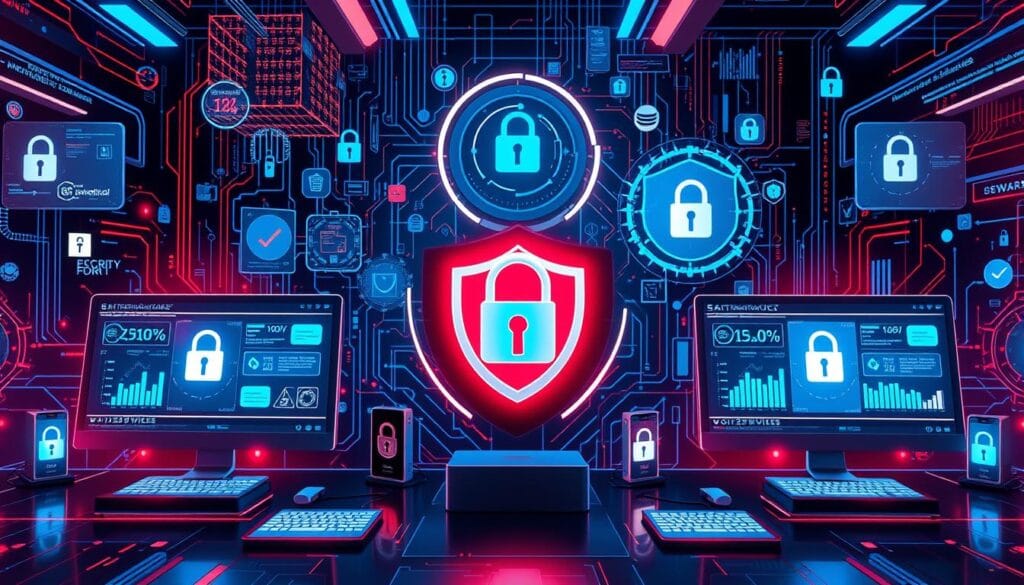Table of Contents
Is Microsoft Authenticator a Spyware Software? In today’s world, our digital lives are deeply connected to everything we do. The need for online security has never been more critical. I felt vulnerable the first time I faced a potential breach in my online accounts.

I then looked for solutions like Microsoft Authenticator, hoping it would strengthen my security.
Microsoft Authenticator promises to protect our digital world. But with advanced cyber threats and surveillance worries, a big question arises. Is Microsoft Authenticator truly secure, or is it just another spyware in our devices?
It’s vital to carefully examine the tools we use for our digital safety. This article will explore Microsoft Authenticator’s features, look into privacy concerns, and offer a clear view. Is this app a protector of our security, or a hidden spy?
Key Takeaways
- The rising importance of online security in our digital lives.
- Microsoft Authenticator’s role and promises in enhancing user security.
- Growing concerns over whether Microsoft Authenticator is a spyware software.
- The necessity of understanding our digital safety tools.
- An overview of the upcoming investigation into Microsoft Authenticator’s security and privacy.
What is Microsoft Authenticator?
Microsoft Authenticator is a key part of cyber security software. It adds an extra layer of protection with two-factor authentication. This means you need more than just a password to access your account.
Overview of Microsoft Authenticator
The app is a tool for multi-factor authentication. It helps keep both personal and work data safe online. It stops unauthorized access, making the internet safer for everyone.
Primary Features and Functions
Microsoft Authenticator has many features for different needs. Here are some of the main ones:
- *Biometric verification*: This lets you use fingerprints or facial recognition to log in. It’s an extra security step.
- *App-based authentication*: You get time-based one-time passwords (OTPs) for quick and safe access.
- *Secure backup*: The app helps you back up your account safely. This is useful if you lose your device.
These features make Microsoft Authenticator a strong cyber security software choice. It offers complete protection with two-factor authentication.
How Does Microsoft Authenticator Work?
Microsoft Authenticator is known for its strong security. It uses one-time passwords (OTPs) and push notifications for two-factor authentication. This makes it a top choice for protecting your data.
One-Time Passwords (OTPs)
Microsoft Authenticator creates unique, temporary passwords called OTPs. These passwords are changed every 30 seconds. This means even if someone gets one, they can’t use it again.
Push Notifications for Two-Factor Authentication (2FA)
Microsoft Authenticator also sends push notifications for 2FA. When you log in from a new device, it alerts your phone. This quick verification and alert system makes it a powerful security tool.
Is Microsoft Authenticator a Spyware Software?
Many users wonder if Microsoft Authenticator is spyware. This worry comes from the app’s permissions, data access, and privacy policies. Knowing these details can clear up if the app is a real cybersecurity risk.
To check if Microsoft Authenticator is a spyware, we need to look at a few things:
- App Permissions
- Data Access
- Privacy Policy
First, Microsoft’s Authenticator needs certain permissions to work well. But, some think it might get too much data. It’s smart to watch the permissions to spot any spyware detection issues.
Next, how the app handles data is key. Microsoft says it only uses data for logging in, not for spying. Knowing the difference between useful and invasive data use is important.
Last, Microsoft’s privacy policy explains how they use and protect user data. By reading this policy, users can understand how the app works. Microsoft claims their apps, like Authenticator, follow strict security rules to keep data safe from unauthorized access.
It’s good to compare what users worry about with what experts and Microsoft say. Below, we see how user concerns and company statements match up.
| Aspect | User Concerns | Microsoft’s Position |
|---|---|---|
| App Permissions | Worried about extensive permissions | Necessary for functionality |
| Data Access | Fear of unauthorized data use | Strictly for authentication |
| Privacy Policy | Interpreted as vague | Claims transparency and compliance |
Looking at these points helps clear up the spyware myth about Microsoft Authenticator. Also, learning about spyware removal and spyware detection can help ease worries.
Microsoft Authenticator Security
Microsoft Authenticator uses a strong mix of encryption and data protection to keep your information safe. This approach shows the app’s commitment to protecting your data from threats and unauthorized access.
Encryption Techniques
Microsoft Authenticator’s security is built on advanced encryption methods. These methods include:
- End-to-End Encryption: This ensures data sent between your device and Microsoft’s servers is safe. Only those with permission can see the information.
- Secure Storage Protocols: The app uses secure ways to store data on your device. It uses top encryption methods to keep data safe from unauthorized access.
- Cryptographic Algorithms: Microsoft Authenticator uses the latest encryption algorithms, like AES-256. This makes your sensitive data very secure.
User Data Protection
Microsoft Authenticator also has many ways to protect your data:
- Multi-Factor Authentication (MFA): This adds extra security when you log into your account. It makes it harder for unauthorized access.
- Biometric Authentication: You can use biometrics like fingerprints or facial recognition to add an extra layer of protection.
- Regular Security Updates: Microsoft keeps updating the app to fix any security issues. This ensures your data stays safe all the time.
Here’s a quick look at the security features:
| Security Measure | Description |
|---|---|
| End-to-End Encryption | Secures data transmission between user devices and servers |
| Secure Storage Protocols | Uses cryptographic methods to protect stored data |
| Cryptographic Algorithms | Employs advanced algorithms like AES-256 |
| Multi-Factor Authentication | Adds extra security layers for account access |
| Biometric Authentication | Enables fingerprint or facial recognition for data access |
| Regular Security Updates | Keeps the app updated to address vulnerabilities |
Microsoft Authenticator Privacy Concerns
Understanding how Microsoft Authenticator handles user data is key. The app uses strict protocols for data protection and privacy. Users often wonder what data is collected, how it’s stored, and if it’s shared with others.
Microsoft Authenticator collects metadata like user IDs, device info, and location data. While it doesn’t collect sensitive info, metadata is still important for privacy.
The app stores data on secure servers that follow industry standards. Microsoft follows major data protection laws, like GDPR. This means the app handles data carefully, ensuring strong data protection.
Even with these steps, users still have privacy concerns. The app accesses some personal info but promises not to sell or misuse it. Microsoft says it won’t share user data without consent. This makes users feel safer, but they should stay alert.
In short, Microsoft Authenticator aims to protect users’ privacy. But, it’s important for users to know about the app’s data policies. They should check privacy settings often and keep up with security updates to keep their data safe.
Comparing Microsoft Authenticator with Other Cyber Security Software
In today’s fast-paced digital world, keeping our online identities safe is crucial. We’ll look at a detailed cyber security software comparison of Microsoft Authenticator, Google Authenticator, and Authy. We’ll explore their features, ease of use, and security measures to see how Microsoft Authenticator stacks up against others.

Google Authenticator
Google Authenticator is a well-known name in two-factor authentication (2FA). It uses time-based one-time passwords (TOTPs) to boost account security. It’s known for being easy to use and works with many services.
But, it doesn’t offer cross-device syncing, which might make some users choose differently in a cyber security software comparison.
Authy
Authy stands out with features like multi-device support and encrypted backups. This means you can still get into your accounts even if you lose your device. Its user-friendly design and wide platform support make it a strong contender for those who value both flexibility and security.
Authy also offers cross-device syncing, giving it an advantage in this cyber security software comparison.
When we compare Microsoft Authenticator with Google Authenticator and Authy, we see each has its own strengths. The best choice depends on what you need most: easy multi-device access, a simple interface, or offline use. Your choice should match your personal or business security needs.
How to Detect Spyware in Authentication Apps
Understanding internet security is crucial. We must make sure our authentication apps are safe. Spotting spyware means knowing the risks and using the right tools to fight them.
Recognizing Red Flags
Being careful with recognizing red flags in apps like Microsoft Authenticator is important. Look out for these spyware signs:
- Unexpected permission requests
- Excessive data usage
- Frequent app crashes
- Unusual background activity
By watching for these signs, you can boost your internet security. This keeps your authentication process safe.
Tools and Software for Spyware Detection
The right tools are key for spyware detection. Here’s a look at some top spyware detection tools:
| Tool | Features | Compatibility |
|---|---|---|
| Malwarebytes | Real-time protection, automatic updates, and custom scans | Windows, macOS, Android, iOS |
| Bitdefender | Behavioral detection, anti-phishing, and real-time monitoring | Windows, macOS, Android, iOS |
| Avast Mobile Security | App insights, call blocker, and Wi-Fi security | Android, iOS |
Using these tools regularly can help keep your apps safe. Stay alert and check for any odd behavior. This keeps your internet security at its best.
Steps to Enhance Data Protection with Microsoft Authenticator
To keep your data safe with Microsoft Authenticator, follow some key steps. Regular updates and strong security measures are crucial. They help protect your data better.

Regular Updates
Keeping Microsoft Authenticator updated is essential. Updates bring new features and fix security holes. Turning on auto-updates is a simple way to boost security.
Use with Other Security Measures
Microsoft Authenticator is just one part of a strong security plan. Adding strong passwords, VPNs, and extra authentication layers helps a lot. Together, they create a strong defense against threats.
By updating regularly and using different security tools, you make your data safer. This approach greatly reduces risks and improves data protection.
Conclusion
Microsoft Authenticator is key to better online security. It offers One-Time Passwords (OTPs) and push notifications. These features add a strong layer of protection against unauthorized access.
It uses advanced encryption and focuses on protecting user data. This makes Microsoft Authenticator a secure choice.
Some worry if Microsoft Authenticator is spyware. But, it’s designed to enhance security, not spy. It’s important to be aware of privacy issues and use tools to spot spyware.
Microsoft Authenticator is a top tool for online security. It works well with other security tools and keeps getting better. It’s a solid choice for protecting your accounts from cyber threats.
FAQ
What is Microsoft Authenticator?
Microsoft Authenticator is a security app that adds an extra layer of protection online. It makes sure your accounts are safe by asking for a second verification, like a one-time password or a push notification.
How does Microsoft Authenticator ensure my security?
Microsoft Authenticator uses strong encryption to keep your data safe. It also uses biometrics and secure backup methods. These features help protect your accounts well.
Can Microsoft Authenticator be considered spyware software?
No, Microsoft Authenticator is not spyware. It’s a real app made by Microsoft to help keep your accounts safe. The app only asks for the permissions it needs for security, and Microsoft follows strict privacy rules to protect your info.
What are One-Time Passwords (OTPs) in Microsoft Authenticator?
One-Time Passwords (OTPs) are short codes that the app gives you for extra security. They help prove who you are, making it hard for others to get into your account.
How do push notifications work for two-factor authentication (2FA) in Microsoft Authenticator?
Push notifications are alerts that ask you to approve or deny login attempts. They add a quick security layer. Even if someone knows your password, they can’t get into your account without your okay.
What privacy measures does Microsoft Authenticator include?
Microsoft Authenticator has strong privacy features like encryption and secure storage. It follows laws like GDPR and only collects the data it needs. It also doesn’t share your personal info without asking you first.
How does Microsoft Authenticator compare with other cybersecurity software like Google Authenticator and Authy?
Microsoft Authenticator has strong security features like Google Authenticator and Authy. But it stands out because it works well with Microsoft services. It also has a user-friendly design.
How can I detect spyware in authentication apps, including Microsoft Authenticator?
Look for signs like unusual permissions and too much data use to spot spyware. You can also use spyware detection tools and cybersecurity software. These tools help check if the app is safe.
What steps can I take to enhance data protection with Microsoft Authenticator?
To keep your data safe with Microsoft Authenticator, make sure the app is up to date. Use strong passwords and enable other security tools like VPNs. Also, stay safe online to protect your accounts even more.
You can read more tech news by clicking here.
Or you can check our Play Store apps:

